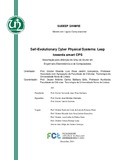Please use this identifier to cite or link to this item:
http://archive.nnl.gov.np:8080/handle/123456789/29| Title: | Self-Evolutionary Cyber Physical Systems: Leap towards smart CPS |
| Authors: | GHIMIRE, SUDEEP |
| Keywords: | Evolution; Cyber Physical Systems; Sensorial modelling; Behavioural modelling; Dynamic re-configuration; Adaptation; Learning. |
| Issue Date: | 28-Mar-2019 |
| Abstract: | Change over time is a fact. The world is characterized by ongoing processes of development, formation, and growth in both natural and human-created systems. For instance the present diversity of plant and animal life arose from the earliest and most primitive organisms through gradual changes. This process of gradual changes over generations is termed evolution and has been long studied in biology which basically leads to the fact that complex, natural systems are not created all at once but must instead evolve over time. Theory of evolution and the fact that evolutionary processes are ubiquitous and critical for social, educational, and technological innovations is accepted by researchers working in different domains. In the scope of this dissertation, the major driving force behind the study of evolutionary principles is solving real-world problems that have frequent changes in the scope of problems or the surroundings of the problem. Cyber Physical Systems (CPSs) are systems that comprises of integration of computation and physical processes. In CPS, computation and communication involves interaction with physical environment to add new capabilities and characteristics to systems. However, the integration of physical component increases the factor for unreliability to the overall system because of the unpredictable behaviours of the physical world. This makes CPS as dynamic systems that are adaptive to the changes that will occur at runtime based on the uncertainties in the physical world. In such types of systems “evolution” is an intrinsic feature. Studying such types of systems and developing suitable solutions has been the goal of this research work. The results thus obtained are presented in this dissertation. Furthermore, the research work presented here provides research results in the direction of self-evolutionary CPS which can be the base for mission critical systems like air-traffic control, disaster detection and also for business processes which are highly dependent on real-time data. In such scenarios, self-evolving systems will be prepared to automatically detect changes in the external circumstances that can affect internal conditions, take mitigation measures (adaptation loop) and learn from the changed scenario based on the acquired understanding of system behaviour (learning loop) so that whole system can take long term mitigation actions to avoid future cases of failure (evolutionary loop). |
| URI: | http://103.69.125.248:8080/xmlui/handle/123456789/29 |
| Appears in Collections: | 000 Computer science, information & general works |
Files in This Item:
| File | Description | Size | Format | |
|---|---|---|---|---|
| Thesis_SG_Final.pdf | 5.84 MB | Adobe PDF |  View/Open |
Items in DSpace are protected by copyright, with all rights reserved, unless otherwise indicated.